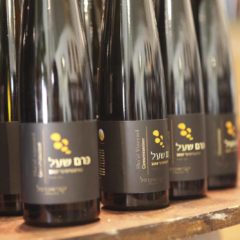精緻與融合的風味是以色列美食美酒的特色
來自東歐,北非,甚至絲綢之路和亞洲沿線國家的移民,將他們的飲食文化帶到了以色列 。結合了中東和地中海傳統的猶太食譜,提供獨特的烹飪風格。這是一場新舊傳統和創新的盛宴。以色列廚師利用他們的創造力反映以色列文化的多樣性,並使傳統與現代品味融合。
美食迎合不同口味
新鮮的街頭美食或是美食餐廳優雅的晚餐,能迎合不同口味。你可能在路邊攤發現炸豆丸子、酥脆的當季鷹嘴豆泥搭配pizza這種經典小吃,或是在更奢侈的餐廳中發現它被當作開胃菜。
戶外用餐是以色列文化的一項特色,公園或是餐廳的花園座位區都可野餐或是烤肉。Sarona是特拉維夫的熱門露天美食地點,結合了精緻的餐飲、歷史與休閒。小啤酒廠到處都是,裡面製造手工啤酒,而且近年來許多以色列人也都在家自釀啤酒。
最近三十年來,許多以色列酒廠贏得國際競賽,吸引了世界各地的酒類專家和品酒鑑賞家。猶太人對酒的熱愛達三千多年,儀式用酒已是猶太節日和安息日的一部分。今天以色列有成千上百座酒廠在生產優良的紅白葡萄酒和氣泡葡萄酒。
Fusion of taste is the hallmark of Israel’s food. Israeli cuisine is multicultural, inspired by immigrants from more than 100 countries around the world together with Jewish recipes from Middle Eastern and Mediterranean traditions, combine to offer a unique experimentalism and mélange of cooking styles.
Each of these immigrant communities from Eastern Europe, North Africa, and even countries along the Silk Road and Asia, brought their heritage, culture and, of course, food to the Israeli society, such as couscous from Morocco and spices Ethiopian, to name just a few.
It is a feast of the old and the new, tradition and innovation. Israeli chefs use their creativity to reflect the diversity of Israeli culture and make the traditional relevant to modern tastes.
猶太人的飲食習慣和禁忌
可以用「猶太潔食(Kosher)」的概念來定義猶太人的飲食習慣和禁忌。「猶太教」這個詞是希伯來語中的「適合」或「適當」,描述了適合猶太人食用的食物。根據希伯來聖經,定義哪些食物是猶太食物的系統是由古代晚期的拉比(Rabbi)開發的。這些法律包括禁止在同一餐中食用肉類和乳製品,人道屠殺動物,以及完全禁止食用血液,豬肉,貝殼魚和其他被禁食物。對食品生產的拉比監督(稱為hashgacha的做法)使其能夠帶有「批准印章」。然而,在這方面,正如在猶太宗教法律和習俗的其他事項中,遵守的程度和方式在猶太教的三個主要當代趨勢——東正教、保守派和改革宗之間有所不同。
以色列飲食風格
超過5%的以色列人口是素食主義者,是世界上最大的百分位數。特拉維夫人均素食者人數最多,是世界上素食主義者之首。以色列的素食主義者擁有獨特的菜餚,甚至會讓食肉者垂涏三尺。
以色列菜基本上遵循地中海飲食,以新鮮食物和當地最好的食材為基礎,特別是:西紅柿,黃瓜,茄子,橄欖油和魚類。
如同其他地中海國家,以色列的飲食中也充滿當地種植的蔬果、橄欖油、堅果和魚類以及當地的美味食物例如鷹嘴豆泥(雞豆抹醬)和中東芝麻醬。充滿精力的肉蛋菜靈感來自歐洲與中東傳統,是以色列菜藝的一環;名為Shakshuka的以色列菜源自猶太、突尼斯和摩洛哥,是用辣西紅柿醬搭配的完美的晚餐。
The eating habits and taboos of Jewish people can be defined by the concept of “Kosher”. The word “kosher” is Hebrew for “fit” or “appropriate” and describes the food that is suitable for a Jew to eat. With its roots in the Hebrew Bible, the system of defining which foods are kosher was developed by the rabbis of late antiquity. These laws include prohibitions against the eating of meat and dairy products at the same meal, humane ritual slaughter of animals, and total prohibition against the eating of blood, pork, shell-fish and other proscribed foods. Rabbinic supervision of the production of food (a practice called hashgacha) enables it to carry a “seal of approval”. However, in this, as in other matters of Jewish religious law and custom, the degree and manner of observance differs among the three major contemporary trends in Judaism – Orthodox, Conservative and Reform.
Israeli cuisine basically follows a Mediterranean diet based on fresh food and the best local ingredients, in particular: tomatoes, cucumbers, eggplant, olive oil and fish.
Over 5% of Israeli population are vegan, the largest percentile in the world. With the most vegans per-capita, Tel Aviv is the vegan capital of the world. Vegans in Israel are blessed with local gems that are vegan by design, but beyond those there are unique dishes that will make even carnivores drool.
靈魂食物
聖經中的「七糧」--小麥、大麥、葡萄、無花果、石榴、橄欖和棗子--都是以色列土地上的作物,且常在當代以色列飲食中出現。這些健康的食物凸顯出以色列聖經土地和現代國家之間的連貫性。
食物在猶太人的生活中扮演一個重要的角色。大家庭聚餐是每個假日的重心,每個人都帶來傳統菜餚,例如安息日(shabbat)的慢燉(Hamin或Cholen)、光明節(Hanukkah)的馬鈴薯煎餅(Latkes)。
參觀當地市場為遊客提供了一個獨特的機會
如果想接近當地人生活的感覺,耶路撒冷馬哈尼耶胡達市場(Mehane Yehuda Market)或許會是個讓你喜歡的景點,可以在不同的文化和美食之間暢所欲言地共存。廣受當地人和遊客的歡迎,可以放慢腳步好好探索,白天來有白天的市場樣,250個小攤位有賣蔬果、甜點、來自摩洛哥的蒸粗麥粉、埃塞俄比亞的香料、和其他東西,晚上又是另一番當地酒吧休憩的風情。這個市場非常乾淨,住在新城區可以來逛一下,記得安息日不開門。
A visit to local markets offers visitors a unique opportunity to hop between cultures and cuisines all happily coexisting in close quarters. The most famous one is Jerusalem’s Mahne Yehuda market. It is widely recognized as a symbol of the Jerusalem, and for a very good reason: Jerusalemites see it as a place that represents them, symbolizes them, and gives them a unique identity in a larger Israeli social context. It is beyond words, because it reminds Jerusalemites of themselves, their childhoods, and the Jerusalem they love.
Israeli street food is all about creative fusions, flavors that pop, and awesome vibes. What is the most popular? Falafel, crispy balls of seasoned ground chickpeas, served at a roadside kiosk in fresh pita bread with tehina and fries? Shwarma? Shakshuka? You won’t find an Israeli who doesn’t like hummus and you can enjoy it pretty much on every corner.
Israeli breakfas is a thing. The Israeli breakfast dates back to the Kibbutz, providing a nutritious meal for the farmers on their way to the field. These days the Israeli breakfast is as diverse as Israel itself – lots of flavors, concepts and colors.
So what is it with Israelis and tomatoes? It’s one of the biggest stars of contemporary Israeli cuisine and comes in every shape and form. And wait till we get to the Shakshuka and the Israeli salad.
圖:以色列外交部Israel Ministry of Foreign Affairs























